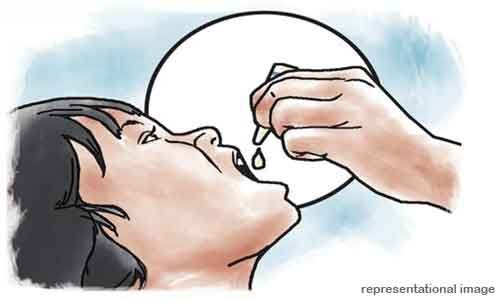- Home
- Medical news & Guidelines
- Anesthesiology
- Cardiology and CTVS
- Critical Care
- Dentistry
- Dermatology
- Diabetes and Endocrinology
- ENT
- Gastroenterology
- Medicine
- Nephrology
- Neurology
- Obstretics-Gynaecology
- Oncology
- Ophthalmology
- Orthopaedics
- Pediatrics-Neonatology
- Psychiatry
- Pulmonology
- Radiology
- Surgery
- Urology
- Laboratory Medicine
- Diet
- Nursing
- Paramedical
- Physiotherapy
- Health news
- Fact Check
- Bone Health Fact Check
- Brain Health Fact Check
- Cancer Related Fact Check
- Child Care Fact Check
- Dental and oral health fact check
- Diabetes and metabolic health fact check
- Diet and Nutrition Fact Check
- Eye and ENT Care Fact Check
- Fitness fact check
- Gut health fact check
- Heart health fact check
- Kidney health fact check
- Medical education fact check
- Men's health fact check
- Respiratory fact check
- Skin and hair care fact check
- Vaccine and Immunization fact check
- Women's health fact check
- AYUSH
- State News
- Andaman and Nicobar Islands
- Andhra Pradesh
- Arunachal Pradesh
- Assam
- Bihar
- Chandigarh
- Chattisgarh
- Dadra and Nagar Haveli
- Daman and Diu
- Delhi
- Goa
- Gujarat
- Haryana
- Himachal Pradesh
- Jammu & Kashmir
- Jharkhand
- Karnataka
- Kerala
- Ladakh
- Lakshadweep
- Madhya Pradesh
- Maharashtra
- Manipur
- Meghalaya
- Mizoram
- Nagaland
- Odisha
- Puducherry
- Punjab
- Rajasthan
- Sikkim
- Tamil Nadu
- Telangana
- Tripura
- Uttar Pradesh
- Uttrakhand
- West Bengal
- Medical Education
- Industry
Rotavirus vaccine not associated with intussusception in Indian infants: NEJM

India: Rotavac, a rotavirus vaccine, is not associated with intussusception in Indian infants, reveals postmarketing surveillance data. The findings of the study were published in the New England Journal of Medicine.
Rotavac is an oral monovalent, live, attenuated rotavirus vaccine that contains a naturally occurring bovine–human reassortant 116E strain. It was introduced in India in 2016 through the universal immunization program.
Rotavirus vaccination has been associated with intussusception risk as first identified in 1998 when the first licensed rotavirus vaccine RotaShield was withdrawn due to the increased risk of intussusception. Then subsequent, large, prelicensure trials of rotavirus vaccines Rotarix and RotaTeq did not show increased intussusception risk. However, postmarketing surveillance of Rotarix in the US, Australia, Mexico, England, and Brazil showed one to six excess cases of intussusception per 100,000 vaccinated children. Postmarketing surveillance of RotaTeq in the US and Australia showed one to seven excess cases of intussusception per 100,000 vaccinated children.
Despite the increased risk of intussusception associated with rotavirus vaccine, WHO has recommended its introcution in childhood vaccination program. This is because incidences of rotavirus infection and deaths due to diarrhea that were averted by rotavirus vaccine was much greater than the cases of intussusception, resulting in a favorable risk–benefit ratio.
There are limited background data on intussusception in India. Postmarketing surveillance data would be useful in assessing whether the risk of intussusception would be similar to the risk seen with different rotavirus vaccines used in other countries. Considering this, Gagandeep Kang, Christian Medical College Vellore, Vellore, Tamil Nadu, India, and colleagues conducted a multicenter, hospital-based, active surveillance study at 27 hospitals in India.
It enrolled infants who met the Brighton level 1 criteria of radiologic or surgical confirmation of intussusception. Rotavirus vaccination was ascertained by means of vaccination records.The relative incidence (incidence during the risk window vs. all other times) of intussusception among infants 28 to 365 days of age within risk windows of 1 to 7 days, 8 to 21 days, and 1 to 21 days after vaccination was evaluated by means of a self-controlled case-series analysis. For a subgroup of patients, a matched case–control analysis was performed, with matching for age, sex, and location.
A total of 970 infants with intussusception were enrolled, and 589 infants who were 28 to 365 days of age were included in the self-controlled case-series analysis from the period of April 2016 through June 2019.
Key findings of the study include:
- The relative incidence of intussusception after the first dose was 0.83 in the 1-to-7-day risk window and 0.35 in the 8-to-21-day risk window.
- Similar results were observed after the second dose (relative incidence, 0.86 and 1.23 in the respective risk windows) and after the third dose (relative incidence -- 1.65 and 1.08 respectively).
- No increase in intussusception risk was found in the case–control analysis.
"In this postmarketing, active surveillance study, we found that Rotavac, an oral rotavirus vaccine produced in India, was not associated with intussusception in the population studied," concluded the authors.
The study, "Intussusception after Rotavirus Vaccine Introduction in India," is published in the New England Journal of Medicine.
DOI: https://www.nejm.org/doi/full/10.1056/NEJMoa2002276
Dr Kamal Kant Kohli-MBBS, DTCD- a chest specialist with more than 30 years of practice and a flair for writing clinical articles, Dr Kamal Kant Kohli joined Medical Dialogues as a Chief Editor of Medical News. Besides writing articles, as an editor, he proofreads and verifies all the medical content published on Medical Dialogues including those coming from journals, studies,medical conferences,guidelines etc. Email: drkohli@medicaldialogues.in. Contact no. 011-43720751


